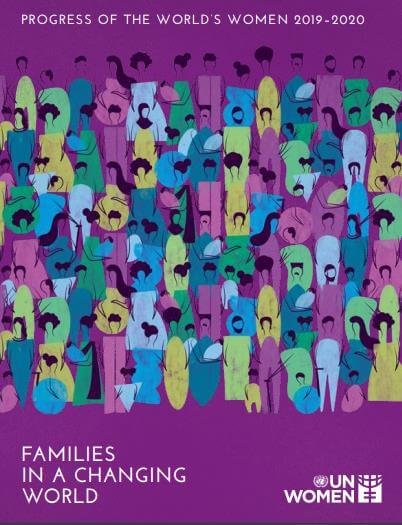- Share this article
- Subscribe to our newsletter
Progress of the World’s Women 2019-2020
As women’s rights have advanced over the past decades, families around the world have become a place of love and solidarity but also one where fundamental human rights violations and gender inequalities persist, according to the report Progress of the World’s Women 2019-2020: Families in a Changing World published by UN Women in late June 2019.
Anchored in global data, analysis and case studies, the report shows the diversity of families around the world and provides recommendations to ensure that laws and policies support today’s families and meet the needs of all their members, especially women and girls, together with an analysis of what it would cost to implement them.
Inequalities persist in many countries
Today, three billion women and girls live in countries where rape within marriage is not explicitly criminalised. But injustice and violations take other forms as well. In one out of five countries girls do not have the same inheritance rights as boys, while in others (a total of 19 countries) women are required by law to obey their husbands. Around one third of married women in developing countries report having little or no say over their own healthcare.
Women continue to enter the labour market in large numbers, but marriage and motherhood reduce their labour force participation rates, and the income and benefits that come with it. Globally, just over half of married women aged 25-54 are in the labour force, compared to two-thirds of single women, and 96 percent of married men, new data in the report shows. A major driver of these inequalities is the fact that women continue to do three times as much unpaid care and domestic work as men in the absence of affordable care services.
The report sheds some positive light on parental leave, with an increase of its intake by fathers, particularly in countries where specific incentives, such as ‘daddy quotas’, are in place that reserve a non-transferable portion of the leave for them on a ‘use it or lose it’ basis.
It also puts a spotlight on the challenges that women and their families face when they migrate. Unjust regulations mean that not all families have the right to family reunification, and that they are often excluded from access to public services. When women’s migration status is tied to their partners, it may be difficult or even impossible for them to escape violent relationships.
Transforming families into places of equality and justice
The report calls on policymakers, activists and people in all walks of life to transform families into places of equality and justice – where women can exercise choice and voice, and where they have physical safety and economic security.
An analysis produced for this report found that most countries could implement a package of policies, including income support throughout the life course, healthcare, and care services for children and older persons for less than five per cent of GDP.
Ensuring that families serve as a home for equality and justice is not only a moral imperative, but is essential for the achievement of the Sustainable Development Goals (SDGs), the world’s most comprehensive agenda to ensure human progress.
(UN Women/ile)
More information:
Download of the report Progress of the World’s Women 2019-2020: Families in a Changing World
Further reading:
Rural 21 Issue 3/18 Gender equity





Add a comment
Be the First to Comment